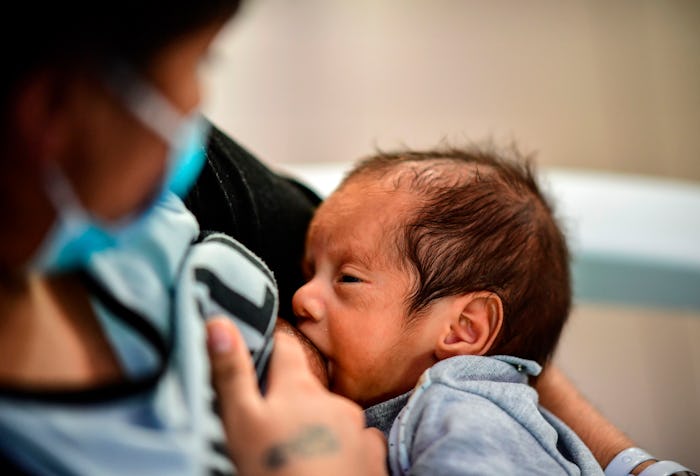Coronavirus

Mothers With COVID-19 Could Pass Vital Antibodies To Their Baby Through Breast Milk
Researchers found babies weren't exposed to COVID through breast milk and may even be protected against it.
Research has long shown that breast milk can protect against a number of illnesses. But now, researchers believe breastfeeding mothers who have COVID-19 could pass vital antibodies to their babies, effectively protecting newborns from the novel coronavirus. Indeed, a study published earlier this week in the journal mBio found COVID-19 antibodies in the breast milk of individuals diagnosed with the virus.
Researchers from the University of Idaho and Washington State University collected 37 breast milk samples from 18 different women — all of whom had tested positive for COVID-19. None of the 37 samples were found to contain the COVID-19 virus, something previous studies have also found. What researchers did find, however, was that a majority of the breast milk samples contained at least one COVID-19 specific antibody.
"Of the milk samples tested, we found that 76% [or 26 of 34 samples] contained SARS-CoV-2-specific IgA and 80% [or 22 of 27 samples] contained SARS-CoV-2-specific IgG," researchers said in their report.
There are a number of different classes of antibodies, also known as immunoglobulins. Immunoglobulin A (IgA) is believed to be the second most common type of antibody and is found in bodily secretions like saliva, tears, mucus, and breast milk, according to Sciencing. Immunoglobulin G (IgG) is the most common antibody found within the human body. It's found in blood and other bodily fluids and, unlike other immunoglobulins, has the ability to cross the placenta, effectively giving it the power to protect an unborn fetus, Sciencing explains.
"The results indicate that it is safe for moms to continue to breastfeed during a COVID-19 infection with proper precautions," Courtney Meehan, a co-author of the study and Washington State University anthropology professor, told WSU Insider.
But any COVID-specific antibodies present in breast milk may not be enough to completely protect an infant against the virus. Researchers noted that although 83% (or 15 out of 18) of the newborns involved in their study were healthy and showed no signs of illness despite their mothers having COVID, three infants were observed to have at least one symptom associated with COVID-19. Moreover, one of those three infants tested positive for COVID. Researchers stressed that in all three cases other members of the infants' households were confirmed to have COVID-19 making it impossible for researchers to identify how exactly the virus was transmitted to the infant.
Still, leading health organizations like the U.S. Centers for Disease Control and Prevention (CDC) and the World Health Organization (WHO) have said there is growing evidence to suggest that COVID-19 does not transmit through breast milk and, in fact, encourage women to continue breastfeeding if diagnosed with the virus — albeit with certain precautions, such as washing an exposed breast that has been coughed on with soap and water before feeding.
While the sample size of this initial study was small, potentially hindering its findings, WSU Insider has reported that researchers at the University of Idaho and Washington State University have already enrolled 50 women with COVID-19 in a study geared at expanding their initial research. Meaning it may not be long until we know more about the potential protective power of breast milk from breastfeeding parents diagnosed with COVID.
If you think you’re showing symptoms of coronavirus, which include fever, shortness of breath, and cough, call your doctor before going to get tested. If you’re anxious about the virus’s spread in your community, visit the CDC for up-to-date information and resources, or seek out mental health support. You can find all of Romper’s parents + coronavirus coverage here.